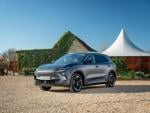In 20 years time, fuel-cell vans will be an affordable option, experts claim.
But what do fleets that wish to green up their acts do in the meantime?
Commercial vehicle operators can’t stick their heads in the sand and pretend that environmental problems don’t exist.
The world we live in – and its health or otherwise – is the responsibility of us all.
And as commercial vehicles contribute to the pollution of our world, the transport industry has a clear duty to ensure that it does everything in its power to minimise its negative effects on the earth.
Environmental issues are not going to go away – in fact as the years go by they are going to get a lot worse.
We are already witnessing rapidly rising fuel prices, wars in oil-producing countries and the prospect of a huge battle for dwindling oil resources as Asian nations become wealthier and start trading in their traditional bicycles for cars.
Fleet operators, too, may soon understand that doing nothing is not an option, as fuel price rises start to really hurt profit margins and Governments and local councils continue to pile on pressure for high polluting vehicles.
Motor manufacturers understand that they have to look to a future that doesn’t include oil.
This includes Mercedes-Benz, which is at the forefront of alternative fuel technology.
The firm invited Fleet Van to Hamburg to view the huge strides it is making in green fuel technology for vans and to talk to Peter Janssen, its head of development and the man dubbed ‘the father of the Sprinter’.
So why exactly does Herr Janssen and his team spend upwards of E100 million a year looking at ways of replacing the internal combustion engine?
He told me: “We at Daimler invented the automobile and we feel especially responsible for its future. Economic growth is inconceivable without commercial vehicles and the global market will continue to grow further as internet shopping increases.
“Parcel deliveries are expected to double between 1996 and 2014.
“That means more noxious emissions but we believe in revolution by evolution.
“Protection of the environment is not free from economic realities and any developments must be affordable.” The Holy Grail of the manufacturers is the hydrogen fuel-cell vehicle which emits nothing more than steam at the rear end – and that technology is available already.
In fact, we were transported to see Herr Janssen in a Daimler fuel-cell powered bus which is currently on trial as a local transport vehicle in Hamburg.
But the twist is that at present a fuel-cell van – and Mercedes-Benz does have a small fleet of fuel-cell Sprinters – would set you back around £1 million.
So obviously a lot more work needs to be done before Joe Public starts ordering up a fleet of them.
Herr Janssen sees an affordable fuel-cell van being on sale in 20 years time.
Work is ongoing to make the unit smaller, lighter and cheaper to build.
But Mercedes isn’t purely concentrating on fuel-cells – a range of greener alternatives is available now which fleets can consider.
These include the new Eco-Start Sprinter, which switches off its engine when the van is stationary for two seconds, a CNG-powered Sprinter which will be in the UK early in 2009 and a petrol/electric hybrid Sprinter which is about to start a three-year trial among fleets in Los Angeles.
Here we look in more detail at what’s on offer and what’s coming up...
NOW
Eco-start
The system is simplicity itself – when the vehicle stops for two seconds, the engine switches itself off.
When you want to start again, you just dab the accelerator and it starts again.
Fleets which thrash up and down the M6 won’t be interested but in big cities that are clogged with traffic, fuel savings can be startling.
We tested this system’s predecessor, MSS, a couple of years ago with two Sprinters in London – one with the system and one without.
The one featuring stop-start saved 37% on fuel – although we did hit some particularly nasty snarl-ups during the test.
Official figures suggest real-world savings of between 5% and 8%.
As Eco-Start costs just £545, it’s a good way for urban fleets to not only save cash, but also to help the environment as less fuel burned means lower noxious emissions in built-up areas.
Eco-Start is not available on automatic Sprinters.
NOW
Sundiesel
NO sooner had biodiesel been lauded as the fuel of the future than the environmental knives were out.
When half the world is starving, we should be growing food, not fuel, the green protestors argued.
There is also evidence that some countries are hacking down virgin rainforests to feed our growing love affair with bio products.
Mercedes-Benz has been working on a new answer – BTL or biomass to liquid, which is now branded SunDiesel.
This new fuel does not compete with food production, instead being made from waste products and renewable raw materials.
As the entire plant is used instead of just a part of it, plus throw-away items such as woodchips, the annual yield of 4,000 litres per hectare is around three times higher than for conventional biodiesel.
SunDiesel has a greenhouse reduction potential of 92%-95% – the highest figure of any alternative fuel.
2009 CNG Sprinter
COMPRESSED natural gas is a fantastic way of going green – it’s completely natural and offers cost savings of around 30% compared to a conventional diesel.
The problem is you can’t buy it at the pumps in Britain, so if you run out away from your depot, you are completely stuffed as you can’t go and get a can of it from base.
So why is Mercedes-Benz bothering to sell the Sprinter NGT in Britain?
Because certain fleets with a big enough depot to carry their own supply – such as local councils – are desperate to cut emissions in cities and this is a good way of doing just that.
And it’s not only exhaust emissions which are cut – CNG-powered vans are a lot quieter too, which could be a plus for urban fleets.
One problem is that these vans will have a low residual value at selling time.
We put this question to Mercedes-Benz LCV chief Steve Bridge and he said this problem could be ‘factored into the buying equation’.
2012 (?) Hybrid starter
WE’VE seen the Honda Insight and the Toyota Prius, but so far this is the first petrol/electric hybrid van, albeit untested in real-life situations.
Mercedes-Benz has made 11 of them to be shipped to Los Angeles for a three-year trial, so don’t expect to buy one just yet.
We drove one of the vans in Hamburg and were left pretty impressed by its quietness and smooth operation.
A switch on the dash allows the driver to opt for either electric power alone or a combination.
Under electric power the van will cover up to 30 kilometres, silently and with no emissions.
In dual mode, the van decides by itself whether to use electric or petrol and when the engine starts up, it’s so quiet you’ll hardly notice it.
While under way, the lithium-ion batteries are recharged by the engine and by braking recuperation.
Otherwise the van can be plugged into the mains in a garage to be recharged overnight
Case study: Follow the green brick road urges Tesco chief
THE head of one of Britain’s biggest van fleets has urged light commercial vehicle operators to follow his example and launch arange of green initiatives.
Dino Papas, fleet and equipment manager at Tesco.com, said his experience so far with environmentally-friendly technology was extremely positive and Tesco was both helping to save the planet and saving money too thanks to its groundbreaking initiatives.
He said: “We run 2,000 vehicles, mainly Mercedes-Benz Sprinters, and have 6,000 drivers.
“We wanted to create a low-carbon operation, a decree which came down from our chairman Sir Terry Leahy, and we’ve been looking at various ways of using less fuel, which helps us and helps the environment too.
“We started by putting speed limiters in our vans, are adding telematics systems and have improved our schedules.
“We’ve also bought 15 Modec electric vehicles and are in talks with Smith Electric Vehicles about trialling the Edison van.
We are looking at ways of reducing our dependence on diesel.
We don’t have all the answers but we have to try different things.”
Mr Papas said he would also be looking to trial the new CNG-powered Sprinter when it arrives in right-hand drive early in 2009.
So what advice does he have for smaller fleets looking to go green and save cash?
Mr Papas said: “Small fleets obviously can’t go to the lengths that Tesco has done but there are lots of simple things that can make a difference.
“For example, fitting speed limiters doesn’t cost a lot of money and will be guaranteed to reduce fuel usage.
“Telematics systems will also improve efficiency for a reasonable outlay.”
And there’s a side issue too, he said, which couldn’t be factored into the business equation, but which was nevertheless important.
Mr Papas said: “We get great positive PR from our green initiatives. More and more people are beginning to be genuinely interested in green issues and they want to buy from a company that is environmentally friendly.
















Login to comment
Comments
No comments have been made yet.